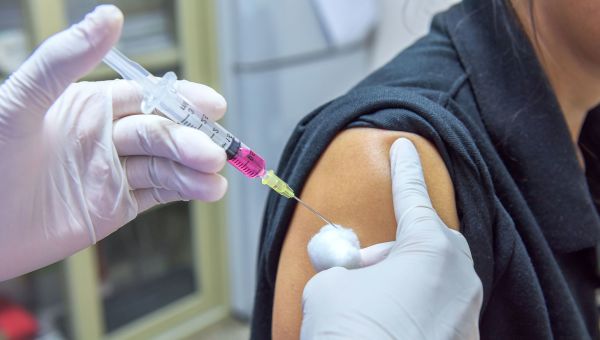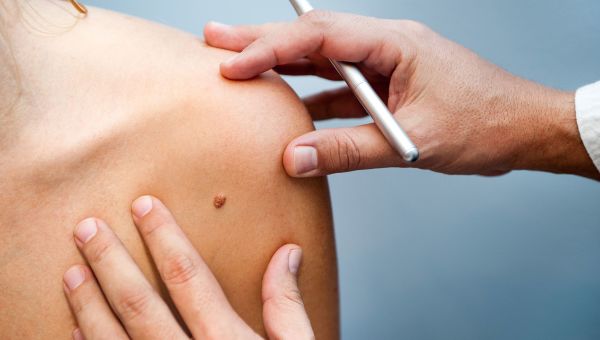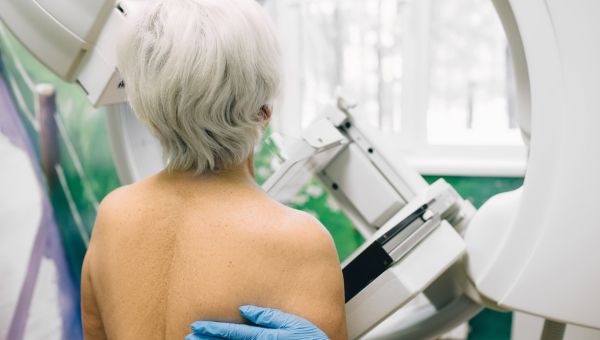Health screenings you need in your 40s and 50s
Detect diseases early with these crucial tests.
Updated on September 26, 2022

Changes come with age, and the ways in which you monitor your health is no exception. Whether you feel healthy or not, it’s important to be screened regularly for certain health issues. Learning about these tests before you see your healthcare provider (HCP) will help you better understand the process—and be better able to anticipate treatments you may need.
Wondering what to expect as you hit middle age? Learn the tests to expect and when to get them.

Vaccinations and Annual Checkups
Many of us received regular checkups as children, but wellness visits are still important through adulthood. During a wellness visit, your HCP will check your medical and family history, record your height and weight, do routine screenings, and more.
While frequency may depend on your age and health status, generally speaking, if you are between the ages of 40 and 49 and otherwise healthy, you should schedule a wellness checkup every one to three years. After you reach 50, you should consider getting a wellness check every year; check with your HCP about the right timeline for these visits.
Arif S. Hussain, MD, an internal medicine specialist in Robbinsville, New Jersey, notes that a regular wellness visit helps your HCP assess general health and should include counseling for disease prevention, based on your risk factors. “This goes for probably every age range, but your doctor should be asking about depression and your mental health,” says Dr. Hussain. “They should be counseling you about diet and exercise, about alcohol and tobacco use.”
At your wellness visit, you can also expect to receive any immunizations you need that year. A flu shot is recommended annually and can be administered by your HCP or at a local pharmacy. If you were never immunized for tetanus-diphtheria, the Centers for Disease Control and Prevention (CDC) recommends that you get a Tdap vaccination. If you were vaccinated as an adolescent, the CDC recommends a Tdap booster every 10 years.
If you are 50 or older, the CDC suggests that you should also get two doses of the shingles vaccine (Shingrix), with two to six months between shots. Immunity to shingles has been shown to stay high for up to seven years after getting the vaccine in people who are not immunocompromised.
Hussain recommends that you ask your HCP about the pneumonia vaccine, as it may be indicated if you have certain risk factors—such as smoking—or a history of conditions like asthma, diabetes, or certain cancers. It’s also smart to ask about COVID shots and booster recommendations, especially if you haven’t been vaccinated yet.

Blood Pressure Screenings
Hypertension—or high blood pressure—puts your heart at risk. It can lead to heart disease and stroke, and nearly half of American adults face that risk due to their blood pressure numbers.
The U.S. Preventive Services Task Force (USPSTF) recommends that people begin blood pressure screenings at age 18. Once you are 40 or older, even if you are healthy with no signs of high blood pressure, you should get screened for hypertension every year, according to the USPSTF.
According to American Heart Assocation (AHA) guidelines, a normal systolic (upper number) blood pressure reading should come in under 120 mm Hg and a healthy diastolic (bottom number) reading should be lower than 80 mm Hg.
“It is advised to periodically check your blood pressure at home just to make sure that it's not creeping up for some reason,” says Hussain. Don’t have access to the equipment? Try your local drugstore. Many offer free or low-cost testing.

Cholesterol Screenings
Cholesterol screenings help evaluate your risk of heart disease. High cholesterol can contribute to buildup in your arteries, which may make them narrower and less flexible, and increase your risk of an event like a heart attack.
According to the AHA, all adults should begin regular cholesterol screenings at age 20. You should continue to get them every four to six years as long as you have no increased risk factors such as smoking, diabetes, or high blood pressure. At 40, the AHA says your HCP will use a formula to find out your risk of having a heart attack or stroke within 10 years. If you are at higher risk, your HCP will likely recommend more frequent cholesterol screenings.
Hussain agrees that if you have high cholesterol, a family history of high cholesterol, or other conditions such as diabetes or kidney problems, your HCP will advise that you get screened more frequently than others.
Cholesterol screenings involve a blood test called a lipid panel. “This blood test breaks it down between the ‘good’ cholesterol (HDL) and the ‘bad’ cholesterol (LDL), and our goal is to keep them within normal limits,” explains Hussain. (That is, a total cholesterol reading under 200 mg/dL.) “It also checks your triglyceride levels to make sure they are all normal.”
If you have an unhealthy cholesterol level—or too much LDL and not enough HDL—your HCP will advise lifestyle changes and possible restrictions. Many HCPs will also want to begin checking your cholesterol more frequently. “We also recommend dietary changes and make sure people exercise on a regular basis before we prescribe medication,” says Hussain.

Prediabetes and Diabetes Screenings
According to the American Diabetes Association (ADA), more than 8.5 million adults with diabetes are undiagnosed, even though a staggering 1.4 million Americans are diagnosed every year. That’s why diabetes screening is crucial.
The USPSTF recommends that adults between the ages of 35 and 70 who are overweight or obese get screened for prediabetes even if they do not have symptoms. You should get screened at an earlier age if you have high blood pressure or are from a population with a higher risk of diabetes, including:
- American Indian/Alaska Native
- Black
- Hispanic/Latino
- Native Hawaiian/Pacific Islander
- Asian American with a BMI of greater than 23
Hussain notes that there are several tests that can evaluate your blood sugar (or blood glucose) levels. One blood test is done in the morning after fasting to measure your blood glucose level. Another is the hemoglobin A1C test, which gives a measure of blood sugar levels over the previous three months. According to USPSTF, if your first glucose test is normal, you should be rechecked every three years.
“If these test results are abnormal—in the sense that you're considered to have diabetes—then we check it every four to six months,” explains Hussain, though some HCPs may check every three months. “But if you're in the prediabetic range, most doctors check it every six months.”

Screenings for Colorectal Cancer
Colorectal cancer—which is cancer in the colon, rectum, or both—is the fourth most common cancer found in Americans. According to updated guidelines published by the USPSTF in May 2021, colorectal cancer screening should begin at age 45 for people with average risk.
“If you have a strong family history of the disease—meaning first-degree relatives such as parents, siblings or children—then you have to start screening 10 years before the age that they were diagnosed,” adds Hussain.
Common screening methods include:
- Fecal occult blood test every year
- Stool DNA test (called Cologuard) every one to three years
- Computed tomography colonography every 5 years
- Flexible sigmoidoscopy every five years
- Flexible sigmoidoscopy every 10 years if you do an annual FIT
- Colonoscopy every 10 years
Hussain notes that the primary tool for colon cancer screening is the colonoscopy, where a scope is inserted through the rectum into the colon to examine the large intestine. According to the ACS, if you choose a screening method other than a colonoscopy and receive an abnormal result, you should then follow up a colonoscopy as soon as possible.

Dental Exams
It's recommended you go to the dentist regularly for a dental exam and cleanings. Oral cancer is more prevalent if you are over the age of 40. Smoking is a major risk factor for periodontal (gum) disease but is by no means the only cause.
Your dentist can evaluate your mouth and throat during this checkup as well. When choosing how often to see your dentist, you want to take your overall health into consideration, according to Hussain. “Your dentist should be aware of medications or other medical illnesses that may affect the teeth or the gums,” he says.
The National Institute of Dental and Craniofacial Research (NIDCR) has reported that about 42 percent of Americans ages 30 and up have gum disease. To help reduce your overall risk, it’s important to brush and floss, get regular cleanings, and follow recommendations from your HCP on following a healthy diet and quitting tobacco.

Eye Exams
The CDC estimates that more than 4.2 million Americans over the age of 40 are either legally blind or have low vision (vision of less than 20/40 in the better-seeing eye). The top causes of vision loss in the United States, according to the CDC, are age-related eye diseases such as:
- Age-related macular degeneration
- Cataracts
- Diabetic retinopathy
- Glaucoma
Other common eye disorders include amblyopia and strabismus.
Around age 40, your chance of developing vision issues starts to rise, and you may begin to have problems seeing things up close. Whether or not you’ve had one before, the American Academy of Ophthalmology recommends that everyone have a baseline comprehensive eye exam at age 40, to check your vision and screen for diseases. Your vision provider can then recommend a schedule for follow-up and/or checkup appointments.
If you have diabetes, hypertension, a family history of eye disease, or existing vision problems, you shouldn’t wait until 40 for a baseline exam. You may also need to see a vision provider more often than others.
“Once you have a diagnosis of glaucoma, visits change to every six months, as the pressure inside your eye needs to be monitored because there are certain medications and sprays for allergies that can increase it,” says Hussain. “For people who are diabetic, there are certain changes we wouldn’t notice that could happen on a microscopic level that only your eye doctor can see and diagnose.”

Skin Exams
Every year, Americans are diagnosed with skin cancer more than all other cancers combined. More than 9,500 people receive skin cancer diagnoses daily in the U.S., and two people die of the disease each hour, according to the Skin Cancer Foundation. By age 70, 1 in 5 Americans will have been diagnosed with skin cancer. Your HCP may therefore perform a skin exam yearly or refer you to a dermatologist.
According to the American Cancer Society (ACS), you may be at higher risk for skin cancer if:
- You or a close relative has had skin cancer
- You’ve been exposed to a lot of sun
- Your immune system is weakened
- You have fair skin, light hair, moles, and/or you freckle easily
Neither the ACS or the American Academy of Dermatology (AAD) have hard and fast rules about skin cancer screening. Instead, they highlight the importance of regular self-examination, especially if you’re at a higher risk. Becoming familiar with your skin can help you detect changes and spot potential cancer early.

Lung Cancer Screenings
If you have a history of smoking, you may be advised to undergo lung cancer screening. According to the USPSTF, you should be screened for lung cancer if you are between the ages of 50 and 80 and have a 20-pack-year smoking history and either currently smoke or have quit within the last 15 years. (A “pack-year” refers to the number of packs smoked per day multiplied by the number of years you’ve smoked. So if you smoke three packs per day for 10 years, it’s 30 pack-years.)
According to the USPSTF, if you have not smoked within the last 15 years or if you develop a health condition that limits your life expectancy and/or your willingness or ability to have surgery to cure lung cancer, screening is no longer necessary.
“Chest X-rays are not used anymore because they’re not as accurate as CAT scans are,” says Hussain. “Now they use a low-dose CAT scan (LDCT)—where the amount of radiation is not as high as a normal CAT scan would be—to make sure you’re not developing lung cancer.” Usually, lung cancer won’t show symptoms until it’s advanced. The earlier it’s detected, the better your chances of survival.

Additional Tests For Women
If you are a woman over age 50 who has broken a bone, you should get a bone density test (DEXA scan) as an osteoporosis screening. If you are at normal risk for osteoporosis, you should begin screening at age 65.
The American College of Obstetricians and Gynecologists (ACOG) recommends women at an average risk of breast cancer get a mammogram every one or two years starting at age 40. The ACS suggests women be given the option of annual mammograms from ages 40 to 44, but should have them each year between 45 and 54. Then, starting at age 55, the ACS recommends having a mammogram annually or every other year.
Both ACOG and the ACS also advise that women should become familiar with the feel of their own breasts so they’re better able to recognize changes. ACOG recommends a clinical breast exam, as well, if you demonstrate symptoms or are at higher risk for breast cancer. Otherwise, discuss the necessity of a clinical exam with your provider.
To screen for cervical cancer, ACOG and USPSTF recommend that if you are a woman between ages 30 and 65, you should also:
- Get a Pap smear every three years OR
- Get an human papillomavirus (HPV) test every five years OR
- Receive a Pap smear and HPV co-test every five years
Women should start being screened for cervical cancer when they turn 21.

Additional Tests For Men
When to screen for prostate cancer is controversial, due largely to the chance of false positives or the fact that unnecessary treatment can cause harm to the patient. Recommendations vary among organizations and much ultimately depends on a patient’s preference.
Prostate screening is no longer routinely given to men who have no symptoms. While some experts suggest starting around age 40, the U.S. National Library of Medicine notes that if you are a man younger than 55, screening for prostate cancer is usually not recommended unless you are at higher risk, which includes having a family history (especially a first-degree relative like a sibling or parent) or being African American.
If you get screened, you will receive a PSA blood test, which is then repeated every year (or more frequently). That said, it’s generally accepted that if you are a man between ages 55 and 69, you should begin discussing the risks and benefits with your HCP. If you’re in a high-risk group, they should begin sooner. “African Americans or those who have a close relative with a diagnosis should begin screenings at the age of 45 or earlier,” says Hussain.
Testicular cancer screenings are generally not recommended without symptoms.

American Academy of Family Physicians. Adult Preventive Health Care Schedule: Recommendations from the USPSTF. Updated July 18, 2021.
American Academy of Ophthalmology. Eye Exam and Vision Testing Basics. Page last reviewed March 8, 2022.
American Academy of Ophthalmology. Get an Eye Disease Screening at 40. Page last reviewed April 8, 2022.
American Cancer Society. American Cancer Society Recommendations for the Early Detection of Breast Cancer. Page last updated Jan. 14, 2022.
American Cancer Society. American Cancer Society Guideline for Colorectal Cancer Screening. Page last updated Nov. 17, 2020.
American Cancer Society. Can Lung Cancer Be Found Early? Last revised August 27, 2021
American Cancer Society. How to Do a Skin Self-Exam. Last revised July 23, 2019.
American Cancer Society. Lung Cancer Early Detection. Page last updated Aug. 27, 2021
American Cancer Society. Melanoma Skin Cancer Risk Factors. Page last updated Aug. 14, 2019.
American College of Cardiology. USPSTF Recommendations for Screening for HTN in Adults. April 29, 2021.
American College of Obstetrics and Gynecologists. Breast Cancer Risk Assessment and Screening in Average-Risk Women. Page last reviewed July 2017.
American College of Obstetrics and Gynecologists. Cervical Cancer Screening. Page last reviewed May 2021.
American Dentist Association. Home Oral Care. Last updated July 22, 2020.
American Diabetes Association. Statistics About Diabetes. Page last updated March 22, 2018.
American Heart Association. Heart-Health Screenings. Page last reviewed March 22, 2019. American Heart Association. How to Get Your Cholesterol Tested. Page last reviewed Nov. 9, 2020.
American Heart Association. Understanding Blood Pressure Readings. Accessed September 26, 2022.
Centers for Disease Control and Prevention. Cholesterol: About Cholesterol. Last reviewed June 24, 2021.
Centers for Disease Control and Prevention. Cholesterol: Managing High Cholesterol. Last reviewed October 31, 2017.
Centers for Disease Control and Prevention. Common Eye Disorders and Diseases. Page last reviewed June 3, 2020.
Centers for Disease Control and Prevention. COVID-19: Frequently Asked Questions about COVID-19 Vaccination. Updated September 26, 2022.
Centers for Disease Control and Prevention. Facts About Hypertension. Page last reviewed July 12, 2022.
Centers for Disease Control and Prevention. Influenza (Flu): Influenza Vaccination: A Summary for Clinicians. Last reviewed August 31, 2022.
Centers for Disease Control and Prevention. Tdap (Tetanus, Diphtheria, Pertussis) VIS. Page last reviewed Aug. 6, 2021.
Centers for Disease Control and Prevention. Shingles Vaccination. Last reviewed May 24, 2022.
Medicare.gov. Yearly “Wellness” Visits. Accessed September 26, 2022.
MedlinePlus. Bone Mineral Density Test. January 10, 2022.
MedlinePlus. Cholesterol Levels. Last updated April 4, 2022.
MedlinePlus. Health screenings for men ages 40 to 64. Reviewed April 19, 2020.
MedlinePlus. Health screenings for women ages 40 to 64. Reviewed April 19, 2020.
National Cancer Institute. Skin Cancer Screening (PDQ)–Health Professional Version. Updated September 2, 2022.
National Institute of Aging. Taking Care of Your Teeth and Mouth. Page last reviewed March 13, 2020.
National Institute of Dental and Craniofacial Research. Oral Cancer. Page last reviewed July, 2018.
National Institute of Dental and Craniofacial Research. Periodontal Disease in Adults (Age 30 or Older). Page last reviewed August 2021.
Skin Care Foundation. Skin Care Facts & Statistics. Page last updated May 2022
U.S. National Library of Medicine. Bone Mineral Density Test.
U.S. National Library of Medicine. Health Screenings for Men Ages 40 to 64.
U.S. National Library of Medicine. Health Screenings for Women Ages 40 to 64.
U.S. Preventive Services Task Force. Adult Preventive Health Care Schedule: Recommendations from the USPSTF. As of June 18, 2021.
U.S. Preventive Services Task Force. Breast Cancer: Screening. Page last reviewed Jan. 11, 2016.
U.S. Preventive Services Task Force. Cervical Cancer: Screening. Page last reviewed August 21, 2018.
U.S. Preventive Services Task Force. Colorectal Cancer: Screening. Page last reviewed May 18, 2021.
U.S. Preventive Services Task Force. Hypertension in Adults: Screening. Page last reviewed April 27, 2021.
U.S. Preventive Services Task Force. Lung Cancer: Screening. Page last reviewed March 9, 2021.
U.S. Preventive Services Task Force. Prediabetes and Type 2 Diabetes: Screening. Page last reviewed Aug. 24, 2021.
U.S. Preventive Services Task Force. Prostate Cancer: Screening. Page last reviewed May 18, 2018.
More On


video

article

slideshow


video


video
